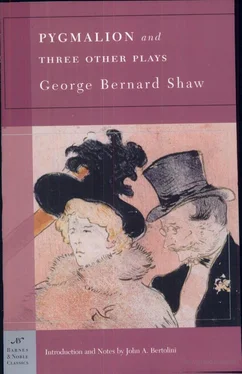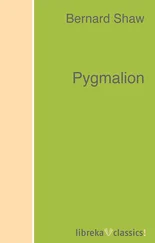1885 — The author’s father, a longtime alcoholic, dies; neither his estranged wife nor his children attend his funeral. Shaw himself never drinks or smokes. He begins writing criticism of music, art, and literature for the Pall Mall Gazette, the Dramatic Review, and Our Corner. Cashel Byron’s Profession is serialized in the periodical Today.
1886 — Shaw begins writing art and music criticism for the World. Cashel Byron’s Profession is published.
1887 — Swedish dramatist and writer August Strindberg’s play The Father is performed. The Social Democratic Federation’s planned march on Trafalgar Square ends in bloodshed as police suppress the protesters; Shaw is a speaker at the event. His novel An Unsocial Socialist is published in book form.
1888 — Shaw begins writing music criticism in the Star under the pen name Corno di Bassetto (“basset horn,” perhaps a reference to the pitch of his voice).
1889 — He edits the volume Fabian Essays in Socialism, to which he contributes “The Economic Basis of Socialism” and “The Transition to Social Democracy.”
1890 — Ibsen completes Hedda Gabler.
1891 — Ibsen’s Ghosts is performed in London. Shaw publishes The Quintessence of Ibsenism, a polemical pamphlet that celebrates Ibsen as a rebel for leftist causes.
1892 — Sidney Webb, a founder and close associate of Shaw, is elected to the London City Council along with five other Fabian Society members. Widowers’ Houses, Shaw’s first “unpleasant” play, is performed on the London stage.
1893 — Shaw writes The Philanderer and Mrs. Warren’s Profession, his two other “unpleasant” plays. The latter is refused a license by the royal censor because its subject is prostitution; as a result, the play is not performed until 1902. Widowers’ Houses is published.
1894 — Seeking a wider audience, Shaw begins a series of “pleas ant” plays with Arms and the Man, produced this year, and Candida, a successful play about marriage greatly influenced by Ibsen’s A Doll’s House.
1895 — Shaw writes another “pleasant” play, The Man of Destiny, a one-act about Napoleon, and drama criticism for the Saturday Review.
1896 — Shaw completes the fourth “pleasant” play, You Never Can Tell. He meets Charlotte Payne-Townshend, a wealthy Irish heiress and fellow Fabian. The Nobel Prizes are established for physics, medicine, chemistry, peace, and literature.
1897 — Candida is produced. The Devil’s Disciple, a drama set during the American Revolution, is successfully staged in New York. Shaw is elected as councilor for the borough of St. Pancras, London; he will serve in this position until 1903.
1898 — Shaw writes Caesar and Cleopatra and publishes Mrs. Warren’s Profession and The Perfect Wagnerite. His first anthology of plays, Plays Pleasant and Unpleasant, is published. He falls ill and, believing his illness fatal, marries his friend and nurse Charlotte Payne-Townshend; his wife’s fortune makes Shaw wealthy.
1899 — You Never Can Tell premieres. Shaw writes Captain Brass bound’s Conversion.
1900 — The Fabian Society, the Independent Labour Party, and the Social Democratic Federation join forces to form the Labour Representation Party, which is politically allied to the trade union movement. The party wins two seats in the House of Commons. Captain Brasshound’s Conversion is produced. Three Plays for Puritans collects The Devil’s Disciple, Caesar and Cleopatra, and Captain Brassbound’s Conversion.
1901 — Strindberg’s Dance of Death is completed. The Social Revolutionary Party, instrumental in the Bolshevik Revolution, is formed in Russia. Shaw writes about the eternal obstacles in male-female relations in his epic Man and Superman, which he subtitles “A Comedy and a Philosophy.” He also publishes The Devil’s Disciple and sees Caesar and Cleopatra produced for the first time.
1902 — A private production of Mrs. Warren’s Profession is staged at the New Lyric Theatre in London.
1903 — Shaw publishes Man and Superman. The Admirable Bashville is produced.
1904 — John Bull’s Other Island premieres in London.
1905 — Shaw writes the play Major Barbara, through which he at tempts to communicate many of his moral and economic theories, including the need for a more fair distribution of wealth. It is produced this year, as is Man and Superman. In New York City, Mrs. Warren’s Profession is publicly staged for the first time. Oscar Wilde’s De Profundis is published posthumously. The Sinn Fein party, dedicated to Irish in dependence, is founded in Dublin.
1906 — The Labour Representation Party wins twenty-nine seats and shortens its name to the Labour Party. Henrik Ibsen dies. Shaw’s The Doctor’s Dilemma, a satire on the medical profession, is produced.
1909 — Shaw writes The Shewing-Up of Blanco Posnet and the one act farce Press Cuttings, both banned by the royal censor.
1910 — Shaw writes Misalliance, which he compares to Shakespeare’s The Taming of the Shrew.
1912 — He publishes Misalliance, and his satire Androcles and the Lion is staged for the first time.
1913 — A German language version of Pygmalion, another satire Shaw wrote in 1912, premieres in Vienna.
1914 — With World War I imminent, Shaw publishes a polemical antiwar tract, Common Sense About the War, which provokes a popular backlash and public denouncement. Pygmalion is produced for the first time in English.
1917 — Dejected over the war, Shaw writes Heartbreak House.
1919 — Heartbreak House is published in New-York.
1920 — The canonization of Joan of Arc gives Shaw the idea for a new play. Heartbreak House is produced in New York.
1921 — Shaw publishes five linked plays begun during the war under the title Back to Methuselah, a dramatic work that begins in the Garden of Eden and ends in the year A.D. 31,920.
1923 — Shaw writes Saint Joan, which is produced and hailed as a masterpiece.
1924 — Saint Joan is published.
1925 — Shaw is awarded the Nobel Prize for Literature for Saint Joan. He donates the prize money to fund an English translation of the works of August Strindberg.
1928 — Shaw publishes his nonfiction The Intelligent Women’s Guide to Socialism and Capitalism and writes The Apple Cart, a dramatic comedy set in the future.
1929 — The Apple Cart is produced.
1931 — Shaw visits Russia, where he meets Josef Stalin and Maxim Gorky. He completes the play Too True to Be Good, which explores how war can undermine established morals.
1932 — Too True to Be Good is staged for the first time.
1933 — An international celebrity, Shaw makes his first trip to America. On the Rocks and Village Wooing are produced.
1934 — Shaw writes the plays The Simpleton of the Unexpected Isles, The Six of Calais, and the first draft of The Millionairess during a cruise to New Zealand. Simpleton is produced this year.
1938 — Geneva, a play that imagines a successful League of Nations, premieres.
1939 — Shaw writes Good King Charles’s Golden Days, which is produced this year. He wins an Academy Award for the screenplay for Pygmalion, over which he exercised tight control.
1943 — His wife, Charlotte, dies after a long illness.
1947 — Shaw completes the play The Buoyant Billions.
1948 — The Buoyant Billions is produced in Zurich.
1949 — Shaw’s puppet play, Shakes Versus Shav, is produced.
1950 — George Bernard Shaw dies on November 2 from complications related to a fall from a ladder. He bequeaths funds for a competition to create a new English alphabet based on phonetics rather than Roman letters. The competition, won in 1958 by Kingsley Read, results in the Shavian alphabet.
Читать дальше












